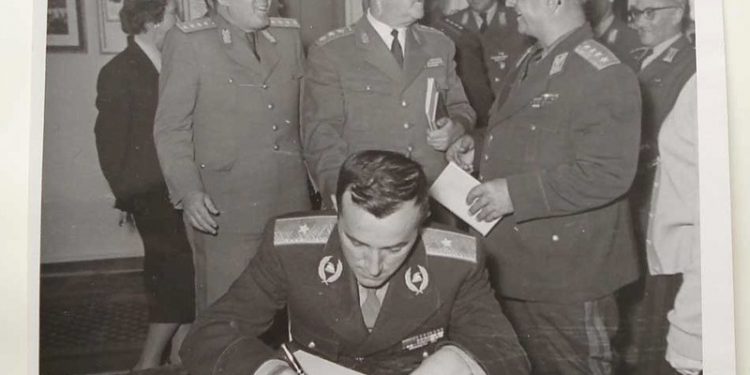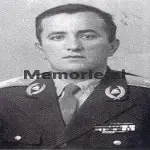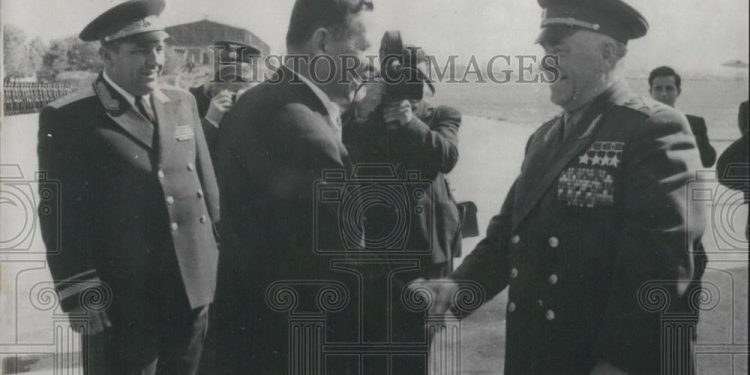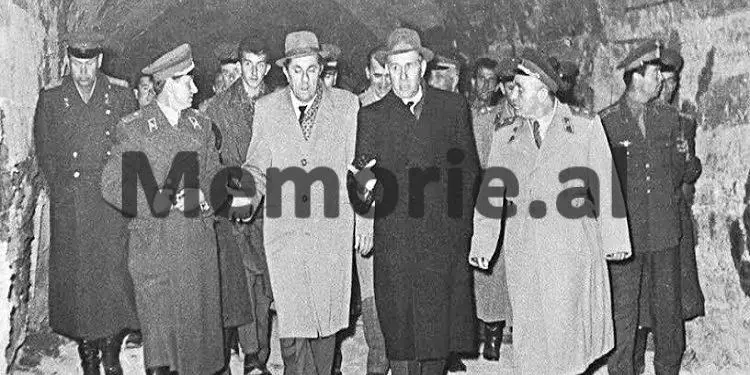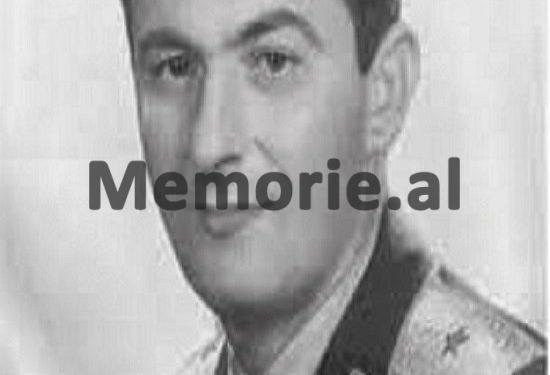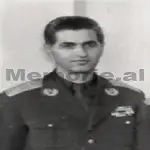By Halim Ramohito
Second part
Memorie.al / Halim Ramohito, one of the remaining former generals from the group of soldiers who were arrested and exiled as the “coup group” of 1974, by Enver Hoxha. At the head of this group was Beqir Balluku, and behind him, the most honorable caste of soldiers of the time, among them General Ramohito, who, after participating in the ranks of the National Liberation Army, had served as a representative of Albania and as a military attaché in The Treaty of Warsaw’. A witness to the break with the Russians, Ramohito would later become a witness to the destruction of the Albanian army by the dictator Hoxha, who showed that during his stay in power, he did not want qualified people around, but only servile ones. Ramohito, calm and with the coldness given to him by the distance of time, took out and published his memoirs, without which perhaps the history of that time with the “putschist group” would not be complete, it might even be written crookedly or deformed …!
With a rare sincerity, he recounts his feelings during the infamous meeting of the PPSh Central Committee, where the military caste of the time, led by Beqir Balluku, were expelled from the party, then arrested and exiled for years. Even though he had to take off his jacket gradually, to work the land like a farmer in the long exile, even though he had to stop seeing his mother even in death, his biggest hostage, the “self-criticisms” that he had to, for the sake of the party. “Enveri killed us even with our own hands…!
Continues from last issue
The meeting of the 6th Plenum of the Central Committee on December 16, 1974, as well as the trials held against us later, were oriented, first of all, to focus on the accusations made by Enver Hoxha, especially in two main directions, which should also form the basis of the criminal lawsuit against us in the courts: – Sabotage of the party line in the field of defense, carried out in cooperation, as members of a counter-revolutionary organization in the army; – Agitation and propaganda, with the mass introduction of hostile bourgeois-revisionist military literature into the army.
For these two directions, the first person who was asked to speak and give an account at the meeting of December 16, 1974, of the VI plenum of the Central Committee, was Lieutenant General Petrit Dume. This is also due to the fact that, after the 5th plenum of the Central Committee in July 1974, Beqir Balluku was interned in Roskovec and there, as Enveri solemnly declared to the meeting, “he is already under arrest…”!
The discussions at the meeting of the 6th plenum of the Central Committee in December 1974 began with this dialogue of Mehmet Shehu with Petrit Duma:
Mehmeti: – If you, Petrit Dume, stand up the army and arrest the Central Committee of the PPSh and the government with your tanks, as Zhukov did in the Kremlin, what does that mean?
Petritis: – High treason.
Mehmeti: – Yes, high treason. But aren’t you, Petrit Dume, a Zhukov of Albania?
Petriti: – I have not committed such a betrayal.
Where did this dialogue about the tanks with which we were supposed to surround and arrest the Central Committee originate?! In 1973, a meeting of some of the main cadres of the Ministry of Defense took place in Shkodër, with Mehmet Shehu, in which I also participated. At that meeting, thoughts were discussed about the measures that should be taken in case of a possible aggression, through our northern and north-western borders and, above all, for the defense of Shkodra.
After getting acquainted with the data of the two sieges of Shkodra in 1911-1912 by the Serb-Montenegros and with the latest data of the Yugoslav exercises in this region, we came to a common conclusion that we had to immediately start from the work for the fortification of the mountain of Taraboshi and the placement in the fortress of Rozafa of MKA batteries, of anti-aircraft artillery cannons, with powerful calibers, even with automatic guidance systems.
We also discussed other measures that should be taken to destroy any possible landing from the sea and the lake that could eventually happen in the region of Shkodra, etc. Our discussions were also focused on the use, in these situations, of the tank units that the corps itself had, which protected the direction of Shkodra, and, especially, of the tank unit deployed in the Laçi region and disguised in underground shelters. The situation at that time, on the border with Montenegro, was different from today.
Now, on both sides of the border, we see hundreds and sometimes thousands of people in vehicles coming and going through these borders, but at that time, apart from the information we received from other sources, we also saw Serbian tanks with our eyes. there, by the border.
The movements, even those only with maps, of this tank unit from Laçi in the direction of Shkodra for the above defensive purposes in the various exercises, were later foolishly labeled as our attempts to surround the party and power bodies in Shkodra, even, according to Mehmet Shehu, they would be another test by the “coup group” to surround and later arrest the Party Central Committee itself.
Even in this theatrical replica with Petrit, the complicated character of Mehmet Shehu appears. In direct relations with us, the generals, he was open, sometimes even very friendly, made and accepted jokes, pretended not to hear any ambiguous words, while outside these relations, he became alienated and changed completely!
In public and especially in front of the army officers, he was harsh and decisive, strict and authoritative, while in front of Enver Hoxha, he suddenly became wise and obedient like a diligent student, because, apparently, he knew from experience that Enver Hoxha would sacrifice you and throw you away like a rag, if you weren’t like that at every moment and if you didn’t, please him, everywhere, with praise and praise. And Mehmeti did this better than anyone else, never missing an opportunity to show his loyalty to Enver Hoxha.
Here is what General Muhamet Prodani, who was once very close to Mehmet Shehu, says about this:
“… This is precisely what I never forgive Mehmet Shehu. When he was not good enough to succeed, why did he enter such a dangerous undertaking…?! Even further, as long as he entered, why did he not stick to his ambition for power, until the end, why did he not face the danger, sacrificing something of himself, so that all his friends and collaborators would not be sacrificed so easily and cruelly his closest in the army?!
Even further: What was all that passion of his, to the point of insanity, to find as many facts and evidence of guilt against us as possible, to expand the circle of “conspirators” as much as possible…?! Didn’t he want to fill his mind, didn’t he seek to be comforted and self-suggested, that he was on the right path and that he wasn’t committing any sin against us, washing his hands like Pilate…?!
I often said those days, when we were alone: “What are you doing like this, you are completely destroying the army…?! What fault did the comrades commit, that you are hitting them so fiercely…”?! ‘Rest, he told me, shut up, because you will eat it too! Don’t you understand that I have nothing to do…”?!
It is a fact that Enveri gladly accepted Mehmet’s praises and often openly said that he was his closest collaborator. But it is so true, that he had never trusted Mehmet Shehu (Not only Mehmet! Enver Hoxha didn’t trust anyone, that man didn’t even trust the shadow of his own skin…) and they proved it preferably the events of 1982. Enveri, who was suspicious of everything and everyone, had since then been targeting Mehmet, for old and new accounts, as he thought that he too seriously endangered his power.
Mehmet Shehu, from the period of LANÇL (1939) until 1974, had appreciated the “People’s Hero” Petri Dume, as one of the most outstanding generals of the War and of building and strengthening our Armed Forces, as a outstanding military strategist, as a general and a soldier at the same time, who led the General Staff, in difficult periods for a quarter of a century, as a very capable general, who had directed affairs with great competence and dedication.
Several times, Mehmeti had also appreciated Petriti as an outstanding connoisseur of military doctrine, who, in addition to the combat experience gained during LANÇL and the construction of the strengthening of our People’s Army in the decades of the post-liberation period, had also graduated with excellent results from two academies high military in the former Soviet Union. These and other high evaluations of General Mehmet Shehu, for Petrit Duma, were well known not only to us, the army generals of that period, but to our entire army.
But even an outstanding leader, with extensive knowledge in all fields, especially military ones, with rare organizational skills for the implementation of tasks, like Mehmet Shehu, however, becomes small in judgments and evaluations, when he sees that the position of prime minister is at risk.
Thus, in 1974, after a 180-degree turn, Mehmet Shehu himself accused Petrit Dume, at the meeting of the 6th Plenum of the Central Committee of PPSh, as a “recidivist putschist” and approved the decision to shoot him. his, while at the meeting of the main cadres of the Army, in December 1974, he did not fail to make a self-criticism, that “…you didn’t know Petrit Duma…”, that “…in fact, he wasn’t even worth like a gang commander…” and that “his long activity in the army has only been wandering without bread, in its units…”! etc.
Mehmet Shehu had been the Minister of the Interior for a while and he knew very well that Enver Hoxha was getting information from different sources about him as well. He was aware that his statements during the analysis of the activity of the so-called “coup group” in the army; “We will not give any other cadre to Beqir Balluk, even after all this hostile activity of his”, were false and wrong steps at the moment, so he began to do his best, to humbly keep the iso to Enver, at every step of his massacre, on the leading cadres of the army and on the army itself.
Of course, Enver Hoxha did the opposite of what Mehmeti said in his statements. He also put the generals on the hit list; Arif Hasko, Vehbi Hoxha, Muhamet Prodani, Abas Fejzo, Todi Naço, Sulo Kozeli, etc., as he knew well the connections and, as he thought, their special devotion to Mehmet Shehu, connections created since the period of the war with him, in the First Partisan Brigade. For this reason, Enver could not let these generals go unpunished in 1974 and, together with them, Mehmet himself, in 1982 and 1983.
Enver Hoxha was also well aware of Mehmet Shehu’s cooperation with Petrit Duma, in the management of army affairs. He knew that they disagreed with each other, not only in concepts, but also in the methods of how they should be implemented in the army. For these reasons, the replies between Mehmet and Petrit, in the meeting of the plenum, as it was proven later, did not fill his mind with Mehmet’s loyalty to him and so, later, he labeled them as a “facade” in front of the plenum , to hide the relationship between them. Enver made good use of Mehmet Shehu in the beginning, as his supporter, to punish us in 1974, but then, he would not even spare him.
It is clear that his end was predetermined in 1974, but this time the dictator was a little more “generous”! He did not judge him in the people and in the army, as he did with us, he did not arrest him and put him in prison, but he forced him to kill himself or killed him (I believe in the first option), in December 1982. I know him Mehmet Shehu’s calligraphy (so also the letter he left after his death) and, from what I have known him in tens of years of joint work, even “under the threat behind the head of the raven”, he would never agree to write it letter without his tragic wish.
Surely, Enver Hoxha knew Mehmet’s point of view, that the punishments related to the so-called “coup” should be limited only to Beqiri, as the latter had indirectly requested in the collection of assets in December 1974, in Durrës: “Even in the works of this asset, only the sound of a single bell was heard…” and “We will not allow any person to take Beqir Balluku with him…”! In the same way, all the collaborators of Beqir, in the work of the theoretical material, in this meeting, Mehmeti described them as; “guilty without guilt”, which meant that the sword of Damocles did not have to strike them.
These opinions, whether open or secret and disguised, of Mehmet Shehu, in my estimation, contradicted the opinions of Enver Hoxha, who, as early as July 1974, as soon as this problem emerged, concluded: ” In the army, we are dealing with a hostile coup and its protagonists, we must sweep them away with an iron broom…”! broom which, throughout his activity, Enveri kept “always ready behind the door of his office and his home”. Enver borrowed the expression “iron broom” from the emperor of Prussia and Germany, Frederick the Great, who, centuries ago, used it when threatening his opponents.
It is no coincidence that more than half of the senior army personnel, participating in the meeting of December 1974, in the Durrës area, by the direct order and decision of Enver, were sentenced to imprisonment, demobilization, demotion, etc. . For these reasons and others like these, Enver Hoxha could not leave without liquidating Mehmet Shehu himself, regardless of the oaths that, as I said above, Mehmet made, as before and at that time, for loyalty to him.
At the meeting of the 6th plenum, on December 16, 1974, in an atmosphere of hatred towards us, the participants of the so-called “coup group” in the army, after Mehmet Shehu’s debate with Petrit Duma, the discussions were continued in this spirit by the lackeys of other zealots of the dictator, especially G.Ç., I.S., M.B. and D.A., ex-employees of the Central Committee apparatus and, as it was clearly seen, their discussions and those of others in that farcical meeting were predetermined and time-directed. These discussions further inflamed the situation. The goal was clear: by any means and in any way, they had to take us out as a hostile group, with a “putschist” organization and platform.
In that meeting, the unscrupulous defamation of the former Deputy Minister of Internal Affairs, R.K., known in many trials, especially in that of Teme Sejko, for forgeries, was received with great interest. In his discussion, R.K., pointing at us, said: “These enemies of the party and the state, in an intimate conversation with each other, said: It is a pity that this matter was revealed to us, before August 1974, since on August 16, we would occupy Radio-Tirana, we would take other measures to isolate the leadership, then we would take power…”! For this, 20,000 Soviet paratroopers would come to their aid – according to him. These data, – told R.K. plenum, – were received from a foreign embassy here in Tirana”.
Here are some of the many questions and other accusations about us, the “putschists”, former members of the Central Committee, made by some of the most diligent and servile servants of Enver Hoxha, prepared for this purpose, to prove that we were enemies and only enemies:
A.Ç. in his discussion at this meeting, he addressed us with the question: “Can you tell us your connections with external enemies”?!
“An officer of the Vlora garrison, in 1972, – said G.N. in his discussion, – reported to the Political Directorate of the Army, that some major army officers were preparing a coup d’état, but this issue was closed by Hito Çako”.
“From an organization – party base in Shkodër,” said the Prime Minister, “I received information that Sadik Bekteshi has had connections with suspicious families in Montenegro”.
“Petrit Dume often came to Cologne,” said J.P. – and there he worked to divide and divide the people into Muslims and Christians”. “Petriti’s wife was in contact with her brother in Lushnje, who is an enemy, and she also sent pies to his house,” said J.P. Thus, in this plenum meeting, apart from the so-called hostile and big issues of defense, “pies” were also mentioned; “With whom have you maintained your hostile relations, at home and abroad”? asked M.P.
“What is the cooperation plan that you would implement”? asked Rr. D., repeating the request to us: “We ask that you reveal the betrayal to us. How did you have and how did you maintain these connections”. Then this one (Rr. D.), addressed us directly, even with “dramatic” words: “All Marxist-Leninists and honest people everywhere in the world have faith in Comrade Enver. Tell us now, you, the putschists, in whom did you have and do you trust…”?!
H.I.: “All of you putschists, you have hugged neck to neck with the class enemy”; “In a party organization in Lushnje, it has emerged that Sadik Bekteshi has been in contact with the Romanian embassy here in Tirana, receiving from there magazines, books, etc.,” said Rr. Gj. in his discussion;
“What conversation did you have, Sadik Bekteshi, with Jepishev, the head of the Political Directorate of the Soviet Army”? asked N.C. (this meeting, which took place as early as 1958, H.R.), etc.
Meanwhile, from the “top” of the assembly stand, which seemed to be even higher than the top of Olympus itself, to create the psychosis there, that we were only enemies, Enver Hoxha, “enraged”, with his finger up and in a loud voice, addressed us: “Leave those discussions that you have prepared in writing, because we know…! Hear what friends are looking for here. Where is the plot, how have you organized it, and only in this direction should you speak…”!
After all those accusations, Petrit Dumja said: “I don’t have any hostile relationship, neither with outside nor inside. It never even occurred to me to do such a hostile work. Throughout my life, I worked in the army, always knowing and thinking that I put all my strength and abilities to serve the country and the people as best as possible”. Then Petriti asked to be given time to prepare for the many questions they asked you, but this was also rejected by Enver Hoxha himself. /Memorie.al
The next issue follows




